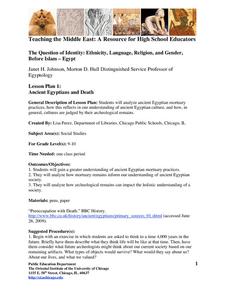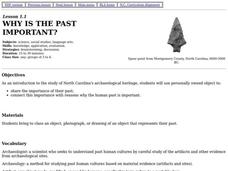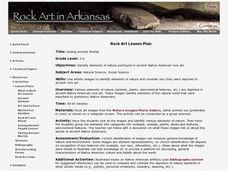Museum of Tolerance
Artifact Research Activity
Artifacts give us the privilege of learning about the past, may it be family, culture, or traditions. Here, class members learn about their family's past with the help of an artifact, or family heirloom. Once an artifact is...
Curated OER
What Do We Learn From the Repartiation of Alaska Native Artifacts?
Students observe and evaluate evidence of Alaska Native cultural symbols and artifacts. They research historical data from a variety of primary resources, including the Harriman expedition journals, related web sites, oral accounts,...
Curated OER
Beauty
Students bring an object to school that is of significant sentimental value to them. They arrange the objects in a class display, examine each other's artifacts and discuss the implications and cultural bias of the word 'beauty'.
Echoes & Reflections
The "Final Solution"
Nazi policies shifted from deportation and imprisonment to extermination of the Jewish people in death camps in the "Final Solution." Learners examine photos of artifacts, read poetry written by survivors, analyze testimony from...
Channel Islands Film
Cache: Lesson Plan 1 - Grades 9-12
Archaeologists have discovered a cache of Native American relics. They want to preserve these relics by removing them from the rapidly eroding site to a lab where they can be studied. Native American traditions demand that the items...
Curated OER
The Study of the Spanish-Speaking People of Texas: Understanding Primary Sources
Pupils analyze Russell Lee's photo essay as a sign of segregation in Texas. They consider the differences between primary and secondary sources and how historians use these sources.
University of Chicago
Ancient Egyptians and Death
What archaeological evidence remains of ancient Egyptian burial and mortuary practices, and what can this information tell us about ancient Egyptian society?
Curated OER
Decoys: Fair or Foul?
Students discover and articulate reasons for cultural change and public policy through study of historic artifacts and testimony using the waterfowl decoys collections in Harvesting the River Online exhibit.
Curated OER
Inventions over Time
Sixth graders examine inventions, such as spear points and bows and arrows, and discuss their importance in human cultural development. They compare these early inventions with modern ones and determine the impact of science and...
Curated OER
Why is the Past Important?
Fourth graders discuss the importance of North Carolina's archaeological heritage. They share with the class an object, photograph, or drawing of an object that represents their own or their family's past.
Curated OER
Chinese, Japanese and Korean Numbers and Luck!
Learners explore numbers in Mandarin Chinese, Japanese, and Korean. They discuss numbers and practice writing and speaking numbers 1-10 in Chinese, Japanese, and Korean. As they create a chart of the three countries' numbers, they...
Curated OER
Stolen Property or Finders Keepers
Students explore the questionable acquisition of priceless artworks gained as spoils of World War II. They become investigators and reporters looking into the matter of ownership of the world's greatest art.
Curated OER
Seeing Ancient Worlds
Students view the images from the Nature Images Photo Gallery and identify various elements of nature. They then group the elements into categories and discuss what these images tell about the worlds of ancient Native Americans.












